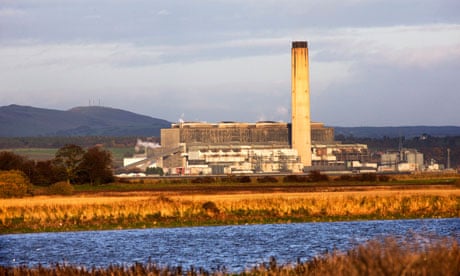More than a hundred carbon capture and storage projects (CCS) must be built to avoid dangerous global warming, an international CCS group said this week, as fears were raised over whether UK projects would benefit from an EU fund for 12 demonstration plants.
The Global CCS Institute said in a report published on Wednesday that governments needed to offer policies that show stronger commitment to CCS. It revealed that only one new large-scale CCS plant was built in the past year, taking the total number to 75, while eight projects were cancelled.
The chief executive, Brad Page, said CCS could play a key role in keeping temperature rises under 2C, the level deemed "safe" by climate scientists, but only with a huge expansion in projects. "The number of operational projects would need to increase to about 130 by 2020, but this seems unlikely, with institute projections indicating that only 51 of the remaining 59 projects identified in our annual survey may be operational by then."
The report came as it emerged that the UK had been given until the end of the month by the European commission to confirm funding for a multibillion EU funding programme, NER300, for 12 new CCS projects. Under the scheme, host countries must co-fund projects for them to be eligible for the pot. A project in Yorkshire bidding for the money, 2Co's Don Valley Power, was ranked by the commission as the favourite for funding among a tranche of submissions in the summer.
But a spokesman for the Department of Energy and Climate Change said it will be responding to the commission [paywall] by the end of the month. "We are fully aware of each other's processes and we've always made clear that we intend to align with the NER timetable."
Liberal Democrat MEP Chris Davies said: "Almost four years have passed since a limited funding support mechanism was approved. Yet today, not a single project has been given the all-clear. If decisions are not reached by the end of this month, Europe will send out a clear signal to the world that it has given up on CCS."
Financial backing for the European project has already been hit by the falling price in carbon credits, the sale of which was earmarked to fund NER300.
The UK has a separate £1bn fund on offer for a commercial-scale CCS project. The fund was set up in April after a previous £1bn competition to fund CCS projects ended when the last bid in the running pulled out last October.
Earlier this week, the energy and climate secretary, Ed Davey, told a gas conference: "CCS matters not only for the continued use of gas in the long-term in the UK; it is also vital for cutting emissions globally. And as we prove the commercial viability of CCS, we have the chance to create in that process an exciting export opportunity for companies that become early leaders in this technology." On Thursday, he announced £20m of funding for R&D into CCS for gas power stations.
Chris Littlecott, senior policy adviser at environmental organisation E3G, said: "CCS can play a significant role in helping to meet UK carbon budgets while stimulating investment in infrastructure and retaining jobs in high-value-added industries. The key sticking point however remains the Treasury. George Osborne has the opportunity to secure CCS as a growth sector the UK – indeed his love of gas must be matched by support for CCS."
